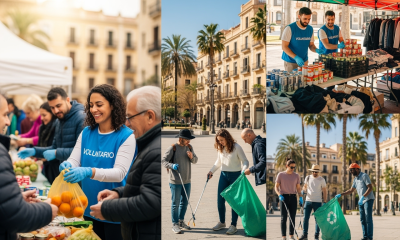Embassies & Consulates
Embassies and Consulates in Spain

Embassies are primarily located in Madrid, with more than 70 foreign embassies representing various nations.
Consulates are spread across major cities like Barcelona, Valencia, and Seville, as well as regions like the Canary and Balearic Islands.
These consulates provide various services, including issuing visas, renewing passports, and assisting with legal matters for both foreign nationals and Spanish citizens residing abroad
(Ministry of Foreign Affairs)
Diplomatic Services:
In cities like Barcelona, consulates from over 50 countries offer services ranging from passport issuance to legal document authentication.
For instance, the British Consulate in Barcelona helps with passport renewals, while the Italian Consulate handles civil registry matters like marriages and births.
Barcelona Consulates:
Barcelona, despite not being the capital, hosts many consulates including those of the UK, Canada, Italy, and France.
These consulates are located in key parts of the city, making them accessible for handling diplomatic and legal procedures for expats and travelers.
Major Embassies:
Madrid, the capital of Spain, is home to the majority of embassies including those of Germany, the Netherlands, and the Philippines.
These embassies not only handle political and economic relations but also provide services such as visa processing, consular protection, and support for cultural exchanges
Additional Services:
Many consulates and embassies in Spain also focus on promoting bilateral economic ties, organizing cultural events, and assisting in emergencies like lost passports or
legal troubles abroad(

Embassies & Consulates
Apply for your Legal type for stay in Spain

We help you choose and apply for the right legal option for your stay in Spain.
From NIE numbers, residency, and padrón registration to visas, work permits, and entrepreneur programs – we guide you through the process step by step.
If you need assistance, simply fill out the form and our team will get back to you.
Embassies & Consulates
What to Do if a Loved One Is Imprisoned in Spain: Guidance for Families and Embassy Support

What to Do if a Loved One Is Imprisoned in Spain: Guidance for Families and Embassy Support
The arrest or imprisonment of a loved one in a foreign country is a distressing and often overwhelming experience, especially in Spain where the legal and prison systems may differ greatly from what families are used to.
When citizens are detained abroad, embassies can play a crucial role in supporting them, and families back home can take specific steps to provide the right help.
Here’s a guide on what embassies can do, how families and friends should respond, and why turning to experienced professionals like GC Libertad can be essential to
navigating the Spanish legal system.
The Role of Embassies in Supporting Citizens Imprisoned in Spain
When a citizen is detained or imprisoned in Spain, their country’s embassy or consulate can be a vital source of support.
Although embassies do not intervene in court cases or guarantee legal representation, they provide essential assistance to protect citizens’ rights and ensure fair treatment.
Here’s what embassies typically do for detained citizens:
1. Notify Families or Designated Contacts
- Family Communication: If the detainee consents, embassies can notify family members or other designated contacts about the situation.
- Updates on Health and Welfare: Embassies periodically visit citizens in prison and provide updates on their well-being to families, helping them stay informed.
2. Provide Lists of Legal Resources
- Connecting to Reputable Lawyers: Embassies offer lists of reputable lawyers in the area, though it’s essential to remember these lists are not endorsements.
Families should research lawyers to avoid common pitfalls, especially as some may prioritize profit over genuine support.
3. Facilitate Communication
- Access to Phone Calls: Embassies can help detainees understand their rights to communicate with family members,
ensuring they have channels to stay in touch with loved ones. - Advocacy for Humane Treatment: If a detainee’s rights or well-being are compromised, embassies can intervene by working with prison authorities to ensure
humane treatment and address any mistreatment.
4. Explain the Legal Process
- Navigating the Legal System: Embassies can provide basic information on the Spanish legal process, helping detainees understand the timeline, their rights,
and how to prepare for hearings or trials. - Language Assistance: Language can be a barrier in legal settings, so embassies may help find interpreters or bilingual legal representatives for non-Spanish speakers.
Steps for Families and Friends of the Detained
When a loved one is detained in Spain, families and friends can take practical steps to help support them effectively.
While embassies provide some support, family involvement can make a big difference.
1. Contact the Embassy
- Verify Detention Status: Confirm with the relevant embassy that your loved one is in custody, as this allows the embassy to intervene on their behalf.
- Stay Updated on Their Welfare: By staying in touch with embassy representatives, families can receive updates on the detainee’s well-being and monitor their progress.
2. Secure Reliable Legal Representation
- Avoid Inexperienced or Profit-Driven Lawyers: Spanish law can be complex, and some legal representatives may take advantage of foreigners unfamiliar with the system.
Choosing experienced legal counsel, such as those recommended by GC Libertad, is crucial to ensuring fair and effective representation. - Consider GC Libertad: GC Libertad works with trusted lawyers, former inmates, and local experts, helping families and detainees find support from those
who understand the Spanish system inside and out. This organization can provide transparent guidance and help avoid common legal traps.
3. Ensure Financial Transparency
- Request Detailed Estimates: Ask lawyers for clear fee structures and payment plans to avoid unexpected expenses.
- Avoid Upfront Payments When Possible: Some less reputable lawyers may ask for large upfront fees but may not provide effective representation.
Relying on recommendations from organizations like GC Libertad, which works only with credible lawyers, can reduce this risk.
4. Understand the Legal Rights and Processes
- Get Information on Spanish Legal Rights: Knowledge of Spanish law can empower families and detainees to ask the right questions and understand what to expect at each stage.
- Use GC Libertad as a Resource: For families unfamiliar with Spanish law, GC Libertad offers anonymous advice and support,
providing insight into the legal rights of detainees and what families can do to support them effectively.
5. Provide Emotional Support
- Regular Communication: Keeping in touch through letters or approved phone calls can help support the detainee’s morale.
- Encourage Patience and Perseverance: The Spanish legal process can be slow, so it’s important to help your loved one stay resilient and focused on positive outcomes.
Why Choose GC Libertad for Legal Guidance?
Families navigating a loved one’s imprisonment in Spain may face challenges understanding local laws, avoiding deceptive legal practices, and managing the emotional toll.
GC Libertad is a resource that can alleviate much of this stress by providing experienced support.
Here’s why GC Libertad is a valuable partner for families in this situation:
- Access to Trusted Lawyers and Advisors: GC Libertad works exclusively with reputable lawyers and professionals familiar with the prison system,
ensuring detainees are represented fairly and families receive honest information. - Guidance from Former Inmates: GC Libertad’s team includes people who have been through the Spanish prison system, offering insights and advice
that only those with direct experience can provide. - Anonymous Advice and Support: Families can contact GC Libertad anonymously to receive support, discuss concerns, and get advice on the next steps without committing to any services upfront.
If you need support, you can contact GC Libertad to anonymously discuss your situation and understand your options before making any legal decisions.
Their experience with Spanish law, combined with a network of trusted advisors, makes them a valuable ally in ensuring detainees receive the fair representation they deserve.
Final Thoughts
When a loved one faces imprisonment in Spain, both embassies and family members play essential roles in supporting them.
Embassies offer critical assistance, but it is equally vital for families to secure knowledgeable legal representation and seek guidance from reliable organizations like GC Libertad.
By working with trusted advisors, families can protect their loved one’s rights, avoid unnecessary expenses, and navigate the complexities of the Spanish legal system with confidence.
For more resources on living and navigating challenges in Spain, visit New In Spain.
Embassies & Consulates
Scandinavian Embassies and Consulates in Spain

A Complete List
For Scandinavians living in or visiting Spain, embassies and consulates offer critical support ranging from passport services to emergency assistance.
Here’s a complete list of Scandinavian diplomatic representations across Spain:
Denmark
Embassy of Denmark: C/ Claudio Coello 91, Madrid
Consulates:
A Coruña
Alicante
Almeria
Barcelona (Calle Mallorca 279)
Bilbao
Jerez de la Frontera
Málaga
Palma de Mallorca
Santa Cruz de Tenerife
Santander
Valencia
Vigo
Norway
Embassy of Norway: Calle Serrano 26, Madrid
Consulates:
A Coruña
Algeciras
Alicante
Bilbao
Las Palmas de Gran Canaria
Málaga
Palma de Mallorca
Santa Cruz de Tenerife
Seville
Valencia
Barcelona (C/Foglietti 2-1C)
Sweden
Embassy of Sweden: Calle Caracas, 25, Madrid
Consulates:
Barcelona (Calle Mallorca 279)
A Coruña (Linares Rivas 30)
Bilbao (Plaza Euskadi 5)
Cartagena (Travesía de los Vientos 1-3)
Jerez de la Frontera (Manuel María González 12)
Las Palmas de Gran Canaria (Luis Morote 6)
Málaga (Córdoba 6)
Palma de Mallorca (Passeig Marítim 14)
Seville (Avenida de la Palmera 2)
Torrevieja (Calle Caballero de Rodas)
Valencia (Calle de la Paz 6)
These embassies and consulates provide essential services such as visa processing, passport renewals, and legal assistance to Scandinavian citizens in Spain.
-
Integration & Community4 weeks ago
Spain’s new Digital Nomad Visa: 2025 updates and requirements
-
Legal Requirements & Documentation4 weeks ago
Driving in Spain in 2025: Updated rules for EU and non-EU license holders
-
Integration & Community4 weeks ago
Why Malaga is Spain’s Top destination for Digital Nomads in 2025
-
Housing & Utilities4 weeks ago
Best Internet & mobile providers in Spain for expats (2025 edition)
-
Banking & Finances4 weeks ago
Tax changes for foreign property owners in Spain (2025)
-
Cultural4 weeks ago
International Feria Fuengirola 2024: a celebration of cultures and community
-
Housing & Utilities2 weeks ago
IPTV – Streaming Box tips to reach your channels and movies
-
Cultural4 weeks ago
Best Spanish festivals and how expats can participate (2025 edition)










































































